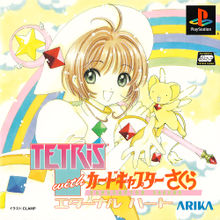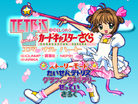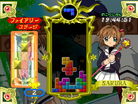This article is a stub. You can help TetrisWiki by expanding it.
Tetris with Cardcaptor Sakura Eternal Heart is the first Tetris game by Arika to be released on a home console. The game lacks a standard mode, and instead plays similarly to Flash Point, where the goal is to clear lines containing jeweled blocks as fast as possible.
The name and gameplay of this game has been carried over to the Sakura mode in Tetris The Grand Master 3 Terror-Instinct.
Story mode
There are two difficulties to the story mode, Easy and Normal. Normal gives a 20 minute limit to complete all 18 stages, but stages can be replayed to get a lower completion time, refunding the time difference into the overall time limit. Easy mode has a flat 3 minute time limit for each stage, but timing out still clears the stage and allows you to continue to the next stage. Topping out in Easy mode still forces you to restart the stage.
Easy mode has an additional mechanic where jewelled blocks get removed from the stack over time and get integrated with Next pieces of the same color randomly. The time delays for particular blocks removed differ between stages (note that playing the Eriol stage cutscene before the level may cause the delays to start before the level timer starts):
Fiery
| Delay |
Colours Removed
|
| 60s |
Yellow, Cyan, Blue
|
| 70s |
Red, Orange, Green, Purple
|
|
Sword
| Delay |
Colours Removed
|
| 50s |
Orange, Yellow
|
| 60s |
Cyan, Blue, Purple
|
| 70s |
Red, Green
|
|
Jump
| Delay |
Colours Removed
|
| 50s |
Yellow, Green, Cyan
|
| 60s |
Orange, Blue
|
| 80s |
Red
|
| 90s |
Purple
|
|
Fly
| Delay |
Colours Removed
|
| 60s |
Orange, Blue
|
| 70s |
Yellow
|
| 80s |
Green, Purple
|
| 90s |
Red, Cyan
|
|
Mirror
| Delay |
Colours Removed
|
| 60s |
Orange, Yellow, Green, Blue
|
|
Windy
| Delay |
Colours Removed
|
| 60s |
Orange, Yellow, Cyan, Blue
|
|
Flower
| Delay |
Colours Removed
|
| 50s |
Red, Orange, Blue, Purple
|
| 60s |
Yellow, Green, Cyan
|
|
Erase
| Delay |
Colours Removed
|
| 10s |
Red, Cyan
|
| 20s |
Yellow, Green, Blue
|
| 30s |
Orange, Purple
|
|
Earth:
none
|
Shadow
| Delay |
Colours Removed
|
| 60s |
Yellow, Green, Cyan, Purple
|
| 70s |
Red
|
| 90s |
Orange, Blue
|
|
Maze
| Delay |
Colours Removed
|
| 50s |
Red, Orange, Yellow
|
| 60s |
Blue, Purple
|
| 70s |
Cyan
|
| 80s |
Green
|
|
Illusion
| Delay |
Colours Removed
|
| 60s |
Red, Green, Cyan, Blue, Purple
|
| 70s |
Orange
|
| 80s |
Yellow
|
|
Wood
| Delay |
Colours Removed
|
| 30s |
Yellow, Cyan
|
| 40s |
Orange, Green, Blue
|
| 50s |
Red, Purple
|
|
Thunder
| Delay |
Colours Removed
|
| 60s |
Yellow, Cyan
|
| 80s |
Orange, Blue, Purple
|
| 90s |
Red, Green
|
|
Glow
| Delay |
Colours Removed
|
| 10s |
Cyan
|
| 60s |
Blue
|
| 70s |
Green, Purple
|
| 80s |
Red, Orange, Yellow
|
|
Shield
| Delay |
Colours Removed
|
| 60s |
Red, Orange, Yellow, Green, Cyan, Blue, Purple
|
|
Watery
| Delay |
Colours Removed
|
| 30s |
Green
|
| 40s |
Purple
|
| 50s |
Blue
|
| 60s |
Red, Orange
|
| 70s |
Yellow
|
| 80s |
Cyan
|
|
Eriol:
none
|
In addition to these, certain levels have recurring Item block effects. Mirror has the stack flip horizontally every 3 pieces placed, Earthy raises the stack with a predetermined garbage pattern every 7 pieces as well as hides the next piece every 17 seconds, Shadow shades the stack if the amount of cleared lines is odd, Illusion triggers the X-RAY effect every 5 pieces placed, Wood raises the stack every 7 pieces on easy and every 3 on normal, Watery has a blue X-RAY effect that is time triggered, and Eriol's stage has a copy of the play stack displayed that you alternate playing between, as well as raising the stack every 5 pieces on Normal.
At any point in a stage, the player can restart the stage with the same piece sequence or a new one. This is useful, given the time-attack nature of the stages.
| Tetris and other puzzle games by Arika
|
|
|
| Arcade releases
|
|
|
|
| Console releases
|
|
|
|
| PC releases
|
|
|
|
| Handheld releases
|
Dr. Mario Express • Puzzle Bobble Universe • Dr. Mario: Miracle Cure
|
|
|
| Topics
|
|
|


